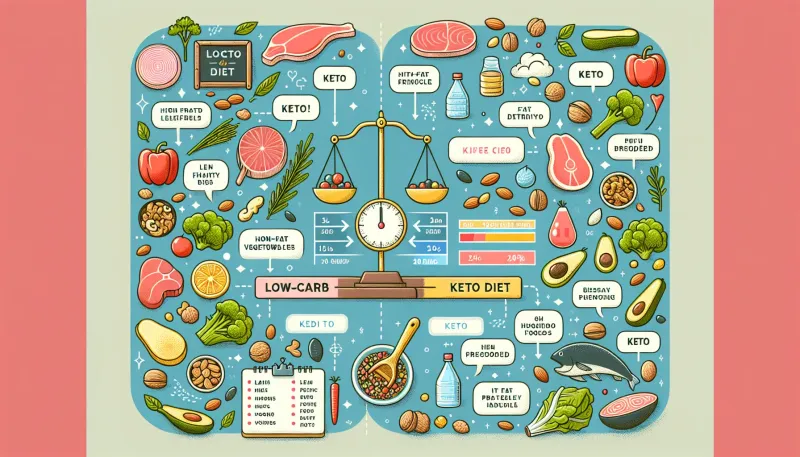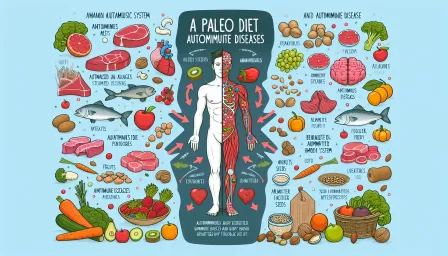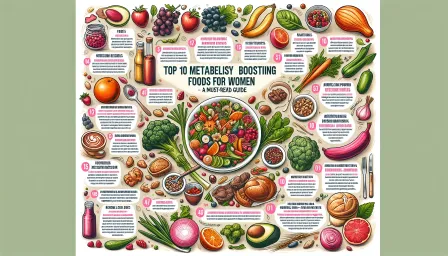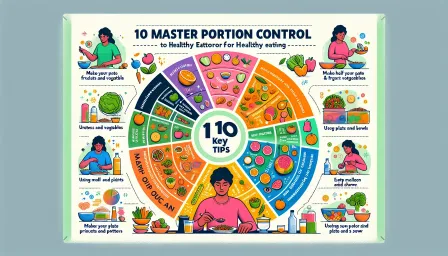Low-Carb Diet vs Keto Diet: Which is Right for You?

Discover the differences between a low-carb diet and a keto diet. Learn which one might be better suited for your health and fitness goals.
In the quest for healthier living, many people find themselves comparing different dietary strategies. Among the most debated are the low-carb diet and the keto diet. Both diets have garnered significant attention, yet they have distinct approaches and benefits. This article aims to clear up any confusion and help you determine which diet might be best for your unique needs.
Understanding the Basics
What is a Low-Carb Diet?
A low-carb diet focuses on reducing the daily intake of carbohydrates while increasing the consumption of protein and fats. The primary aim is to limit carb intake to anywhere between 50 to 150 grams per day, depending on individual goals. This diet is rooted in the idea that lower carbohydrate consumption stabilizes blood sugar levels, aids in weight loss, and improves overall health.
What is a Keto Diet?
The ketogenic (keto) diet, a more restrictive form of low-carb eating, drastically reduces carbohydrate intake to under 50 grams per day, often aiming for about 20 grams. The goal is to enter a state of ketosis, where the body burns fat for fuel instead of carbohydrates. This process produces ketones, which serve as an alternative energy source for the body and brain.
Key Differences
Macronutrient Composition
The primary distinction between these two diets lies in their macronutrient composition. While both advocate for reduced carbohydrate intake, the keto diet is much more stringent.
- Low-Carb Diet: Typically involves around 20-30% carbs, 40-50% protein, and 30-40% fat.
- Keto Diet: Generally recommends about 5-10% carbs, 20-25% protein, and 70-75% fat.
Metabolic Impact
Both diets affect metabolism differently. Due to the restricted carbohydrate intake, the keto diet forces the body into ketosis, fundamentally changing how your metabolism operates. In contrast, a low-carb diet might reduce calorie intake and stabilize insulin levels without necessarily inducing ketosis.
Flexibility and Sustainability
A low-carb diet tends to be more flexible and easier to sustain over the long term. The less rigid structure allows for greater food variety and social dining. The keto diet, with its strict carb limits, requires meticulous meal planning and tracking, which can be challenging and might not be suitable for everyone.
Health Benefits and Risks
Potential Benefits of a Low-Carb Diet
Reduction in carbohydrate intake has several well-documented advantages:
- Weight Loss: Many people experience significant weight loss when switching to a low-carb diet, thanks to decreased calorie intake and improved satiety.
- Improved Blood Sugar Control: Reducing carbs helps stabilize blood sugar levels, which can be beneficial for individuals with diabetes or insulin resistance.
- Enhanced Heart Health: Some studies suggest that low-carb diets may improve markers of heart health, such as lowering triglycerides and increasing HDL cholesterol.
Potential Benefits of a Keto Diet
The keto diet offers unique benefits due to its impact on metabolism:
- Enhanced Weight Loss: When the body is in ketosis, it becomes highly efficient at burning stored fat for energy.
- Improved Mental Clarity: Many adherents report better focus and mental clarity, likely due to the brain's efficient use of ketones.
- Seizure Control: The keto diet was originally developed to manage epilepsy and is still prescribed for this purpose today.
Potential Risks and Considerations
Both diets come with considerations that should be reviewed before making a lifestyle change:
- Low-Carb Diet: Potential nutrient deficiencies can arise if not properly managed. There is also a risk for increased intake of unhealthy fats if not balanced well.
- Keto Diet: The restrictive nature of the diet can make social situations and long-term adherence challenging. It may also lead to "keto flu," a collection of symptoms like fatigue and headaches that occur during the initial transition to ketosis.
Which Diet is Right for You?
Deciding between a low-carb diet and a keto diet depends on several factors, including your health goals, lifestyle, and personal preferences. Here are a few points to consider:
Weight Loss Goals
If your primary objective is weight loss, either diet can be effective. However, the keto diet might offer quicker results due to the metabolic shift that promotes the burning of fat. Yet, a more moderate low-carb diet may be easier to maintain, leading to more sustainable long-term results.
Medical Conditions
For individuals with specific health conditions like epilepsy, the keto diet could provide additional benefits. Conversely, if you have diabetes or insulin sensitivity, both diets could assist in managing blood sugar levels, but a low-carb diet might be easier to stick to and less extreme.
Lifestyle Compatibility
Consider your daily routine and social commitments. A low-carb diet offers more flexibility, making it easier to dine out or enjoy varied cuisines. The keto diet requires more diligent planning and discipline, which might not suit everyone's lifestyle.
Conclusion
Ultimately, the choice between a low-carb diet and a keto diet comes down to your individual needs and preferences. Both diets offer significant benefits, from weight loss to improved mental clarity and better blood sugar control. Before deciding, it’s advisable to consult with a healthcare professional or a registered dietitian to tailor a plan that aligns with your health goals and lifestyle.
By understanding the core principles and differences between these two popular dietary approaches, you’ll be better equipped to make an informed choice that supports your journey to better health and wellbeing.



























